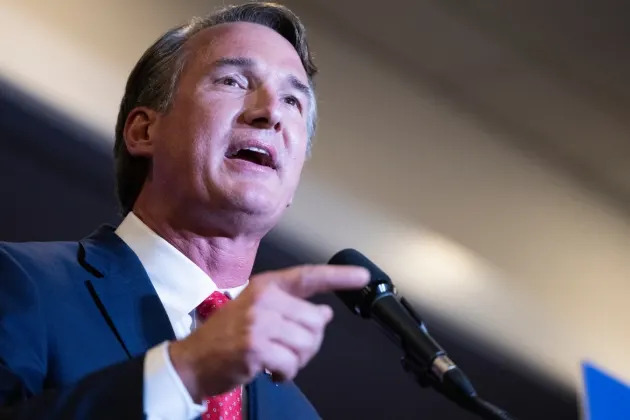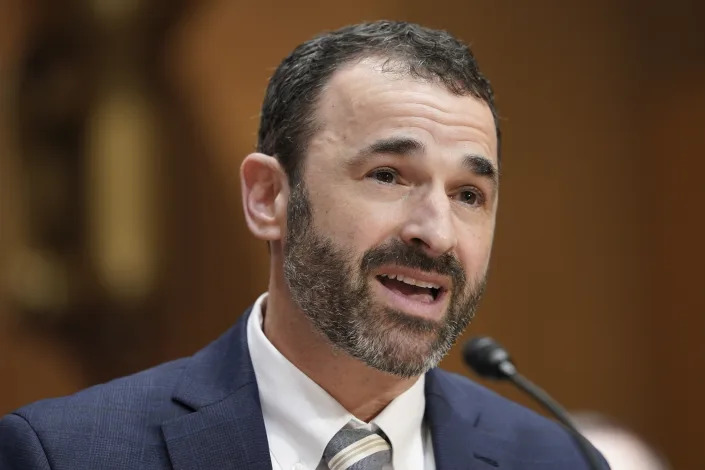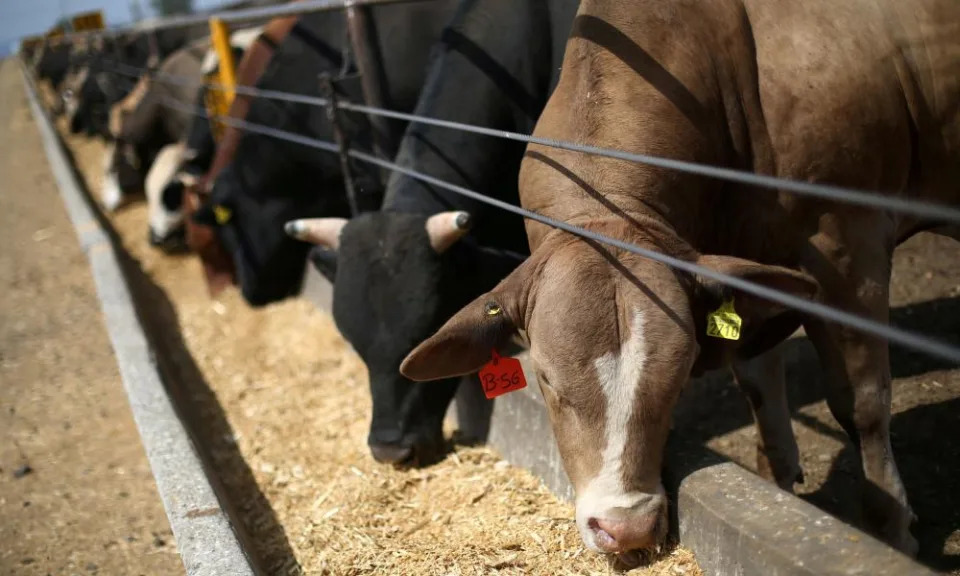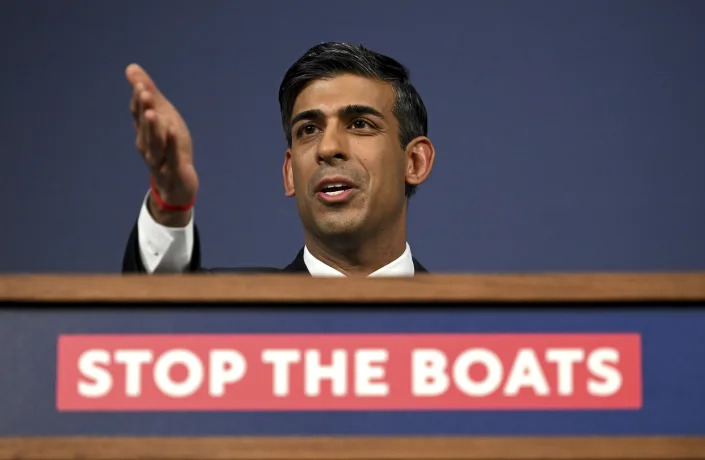Ukrainians who fled war face end of temporary US sanctuary
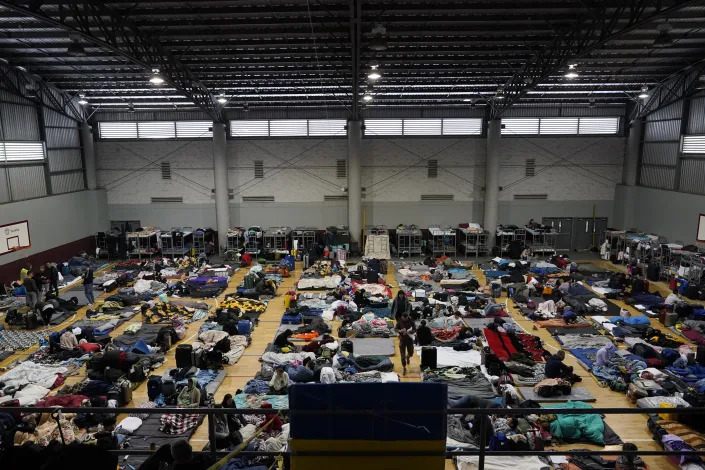


Ukrainian refugees play with frisbees as they wait in front of a gymnasium Tuesday, April 5, 2022, in Tijuana, Mexico. As many as 20,000 Ukrainians who were granted permission to remain in the United States for one year after fleeing the early fighting in their native country are facing their humanitarian parole expiring, according to advocates. (AP Photo/Gregory Bull, File)
JULIE WATSON
Thu, March 9, 2023
SAN DIEGO (AP) — When U.S. officials at the U.S.-Mexico border stamped the Ukrainian passports of Mariia and her daughter last April and gave them permission to stay for a year, she figured she would return home within months.
Now with that year almost up and the war that caused them to flee still raging, their permission to stay in the U.S. — known as humanitarian parole — is set to expire April 23.
“The word `worry’ doesn’t capture what I’m feeling,” said Mariia, who spoke through an interpreter and asked that only her first name be used over concerns that speaking publicly would hurt their immigration case. “This is something that frightens me, mainly because of my daughter and my daughter’s future.”
The 46-year-old woman and her daughter, now 13, are among 20,000 Ukrainians in a similar situation, according to resettlement agencies. Most arrived to the United States at its southern border after fleeing to Mexico, where it was easier and faster to get a visa to enter the country in the first months following Russia’s invasion of Ukraine.
Mariia's parole is tied to her work permit, enabling her to earn a living as a nanny, and makes her eligible for food stamps and other public assistance. Her husband flew to the U.S. to join them in July and received humanitarian parole for two years.
The Biden administration has said it is working on a fix but so far has issued no official guidance on what Ukrainians should do, according to advocates helping the Ukrainians. The Department of Homeland Security did not respond to requests for comment.
Jewish Federations of North America, which provided support for the agency that helped Mariia’s family get settled, is among the organizations that have written to the Biden administration to quickly renew humanitarian parole for Ukrainians.
Krish O’Mara Vignarajah, the CEO of Lutheran Immigration and Refugee Service, said people are scrambling to figure out what to do. One option would be to apply for asylum, but a war doesn't necessarily qualify someone for that.
"Even short-term solutions like individual parole extensions are unclear since there’s no uniform guidance, which leads to delays and confusion,” she said.
Some Ukrainians have considered returning to the U.S. border crossings where they entered to ask for an extension, but that leaves the decision up to the port director, O’Mara Vignarajah said. It can also be expensive to travel and requires time off work, advocates said.
Some have been told by officials to write across the top of the government's parole form “Re-Parole," since there is no option to check for an extension, according to advocates.
“It highlights how ad hoc the process is,” O’Mara Vignarajah said. “These requests often go unanswered or are transferred to different agencies, and because there is no clear process in how to handle them, sometimes they are simply denied.”
The government turned to humanitarian parole as a quick fix to deal with the fallout from the many world crises that have occurred as the U.S. refugee system that was dismantled by the previous administration was being built back up. Now numerous groups are facing their permission to remain in the United States expiring in coming months, including tens of thousands of Afghans.
“Humanitarian parole was never meant to be over relied on at the expense of refugee resettlement or asylum protections," said Meredith Owen of Church World Service.
Liliia Lukianchuk, a Ukrainian mother of four, has applied for asylum with the help of Lutheran Social Services, but she and her husband have not gotten an answer. Their parole expires April 16, and it is tied to her husband’s mechanic job in Jacksonville, Florida, where they live. She fears that if they're sent back, her 17-year-old son will end up on the front lines as a solider.
“Of course, I’m worried because the worst-case scenario would be to be returned to Ukraine, but I have to be strong for my family,” she said through an interpreter.
Mariia and her daughter arrived at the U.S.-Mexico border after trying to settle in four different countries. The lines at Poland's border were too long. In Hungary, they could find a hotel room for only one night at a time and were told by locals that the government was not in favor of hosting Ukrainians. They went on to Belgium, where many Ukrainians were arriving, but the local school had no room for her daughter. Then in Spain, they were told it would be difficult to find work and an apartment. That's when Mariia decided to go to the United States and was told Mexico was the best way.
Jewish Family Services of Greenwich helped her find a job, enroll her daughter in school and get settled in Greenwich, Connecticut.
Mariia said only recently did she and her daughter start feeling hopeful about rebuilding their lives.
“To be honest, the first five months, my eyes to that were closed. My primary goal was to just make sure my child was OK, to calm her down and reassure her that she was safe,” she said.
Tania Priatka of Jewish Family Services said Mariia's family is working with a lawyer who has advised them to wait for guidance from the government. If that doesn't happen soon, they plan to go to the nearest airport and ask Customs and Border Protection officials there for help.
For now, Mariia tries to stay hopeful, but struggles when her daughter asks what will happen.
“I feel lost. I feel hopeless." Mariia said, her voice shaking as she grew emotional. "As a mother, I should be able to give my child an answer that she will be well and that she will be safe.”
